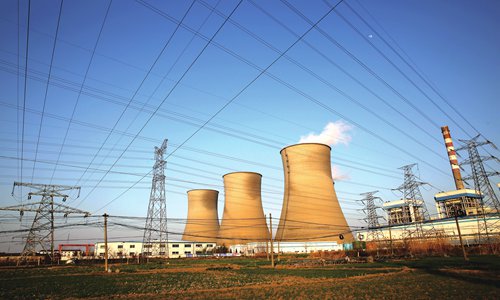
A working power plant in Huai'an, East China's Jiangsu Province, on March 8 Photo: IC

A Chinese expert said that US President Donald Trump citing China in his announcement to quit the Paris climate agreement was not in the spirit of the UN and went against larger trends.
A former senior Chinese official pointed out some misunderstanding in the US president's speech on June 1.
Zhang Guobao, former vice chairman of the National Development and Reform Commission (NDRC), the nation's top economic planner, and former head of the National Energy Administration, said on Friday that Trump was misled by his team of advisors, thepaper.cn reported on Sunday.
China's commitment to reach a carbon emissions peak by 2030 and the allowed building of hundreds of new coal-fired plants are two utterly different concepts, Zhang reportedly said during an energy and climate seminar held in Beijing on Friday.
"China can emit as much as it likes by 2030" is a misreading of the Paris agreement, Zhang said, saying that Trump must have "derived" this, and the agreement has no such concept.
China will never build hundreds of new coal-fired plants; actually, it has canceled the construction of 105 such plants in the past few years, Zhang was quoted as saying.
In his speech on the US withdrawal from the Paris agreement, Trump made more than one mention of China.
The first was when Trump discussed the obligations of the agreement. "Under the [Paris] agreement, China will be able to increase these emissions by a staggering number of years - 13. They can do whatever they want for 13 years."
Then Trump addressed the fairness of the agreement, saying that China will be allowed to build hundreds of additional coal plants and India allowed to double its coal output by 2020 while the US can't. Trump then suggested that he might attend some openings of coal mines in the US. China and the EU announced an alliance to stay the course on May 31 on the news of Trump's planned pull out of the Paris accord.
The Global Times failed to reach Zhang on Sunday out of regular business hours. The NDRC did not reply to a Global Times inquiry on Sunday.
"What is really happening is that China is restricting the building of its coal plants, and the comments on China and India showed that Trump twisted the spirit of the UN Framework Convention on Climate Change (UNFCCC), which states that developed nations and developing nations share common but differentiated responsibilities in emission cuts and emphasizes the primary role for developed nations," Bai Yunwen, policy director of Beijing-based nongovernmental organization Greenovation Hub, told the Global Times on Sunday.
So the listing of the US alongside China and India does not make sense in the spirit of the UNFCCC, Bai said.
"What Trump is really doing, we think, is that Trump chose to honor his campaign pledge [on the withdrawal] despite discord among his team and without giving a careful consideration to the benefits the withdrawal had on the US economy," Bai said.
"Will Trump's four-year term be enough to revive a dying coal industry? Investors have more power in that than a president. And they are following the bigger trend around the world," said Bai, citing the pulling out of funds by the US private sector from the industry as an example.
Lin Boqiang, director of the China Center for Energy Economics Research at Xiamen University, said that the number of coal-fired plants does not contradict China's climate commitment.
"The number of coal-fired plants is adding up in China, that's true. But coal consumption is going down. As only half of the coal consumed is by power plants, the other is used by other sectors such as steel, which is experiencing a global supply glut," Lin told the Global Times Sunday.
"The number of utilization hours of power plants is plunging, from 4,500 hours a year to less than 3,800 hours a year. Emissions are more related to utilization hours than to the number of plants," Lin said.
Focusing on the coal industry will only likely produce limited economic benefits or jobs for the US, compared with other options such as developing new energy sources, Bai said.
Source: Global Times



